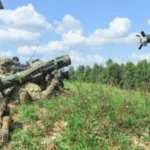The European Union Institute for Security Studies (EUISS) has published an analysis regarding Kosovo’s approach to dialogue and relations with its allies, along with some recommendations.
As mentioned in the final part of this publication, with global elections approaching and the war in Ukraine ongoing, stabilizing the security situation in Kosovo and the Western Balkans is crucial. The document emphasizes that given the region’s current challenges, it is imperative to maintain vigilant oversight over potential escalation points, particularly in northern Kosovo.
The publication suggests the necessity for the West to maintain consistent diplomatic engagement with Pristina and Belgrade during the second half of 2024, as the risk of security escalation is high.
The report recommends that the Government of Kosovo urgently adopt a positive agenda for the Serbs living in Kosovo, including steps to establish the Association of Serb-majority Municipalities and rebuild trust by addressing their legitimate concerns.
“Following the failure of the referendum to remove the mayors in the north, Kosovo should resume dialogue with the EU on the conditions for lifting imposed measures,” the report states.
Long-term Recommendations by EUISS:
Diplomatic Engagement: The EU should intensify diplomatic efforts with the five EU member states that have refused to recognize Kosovo’s independence, especially since all 27 EU member states jointly sponsored the ‘Ohrid Agreement’ which calls for Kosovo’s membership in international organizations. After fully aligning its position with the QUINT countries, Kosovo should collaborate with them to initiate a dialogue with the five non-recognizing EU states for EU and NATO membership. Kosovo should also push for the opening of reciprocal liaison offices in capitals where such a presence is currently lacking.
Building Bridges: Kosovo has much to lose if it insists on rejecting EU recommendations and demands. It stands to gain significantly by making efforts to improve relations with local Serbs and exploring new ways to facilitate the election of new mayors and municipal councilors in its northern municipalities, honoring its commitments and re-engaging in good faith in the EU-facilitated dialogue. Finally, lifting Kosovo’s veto on regional agreements would remove a major obstacle to expanded regional cooperation in the Western Balkans and help foster socio-economic cooperation within the region.
EU Conditionality, Red Lines, and Membership: Once the new College of Commissioners is established, the EU should adopt a robust political strategy to promote ongoing cooperation between Kosovo and Serbia. There is no alternative to the Dialogue. This may include implementing stricter conditions for compliance with the Brussels/Ohrid provisions by both parties and clearly defining red lines that cannot be crossed, including a clear timeline for EU membership for both countries.
Security Preparedness and Prevention: NATO can further support Kosovo’s security structures by developing their capabilities to respond effectively to emergency situations. This could include increased joint exercises and operational planning, as well as strengthening the defensive capacities of the Kosovo Security Force (KSF), particularly in response to security challenges in the north, such as the attack in Banjska. In the long term, this will serve to further align the KSF with NATO standards, potentially paving the way for Kosovo’s eventual inclusion in the PfP framework.







